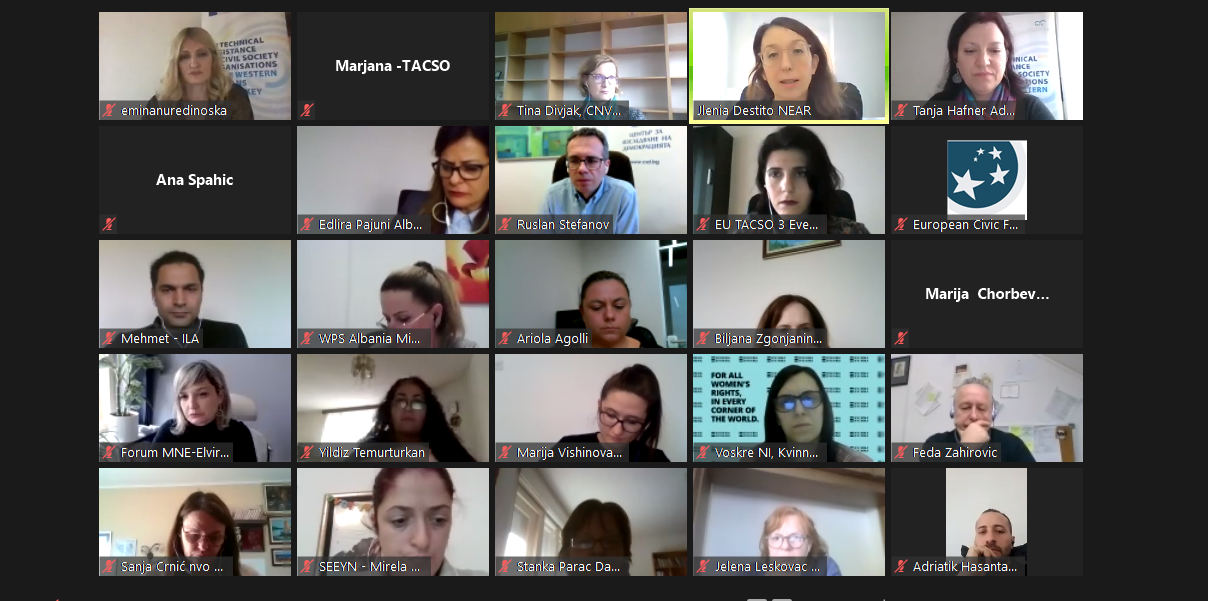

“Civil Society Organisations (CSOs) in the Western Balkan and Turkey should continue building relations, links and cooperation in the future and discover new perspectives for networking. They need to continue to learn from and be sources of knowledge and inspiration to each other”. This was the leitmotif of the discussion during the online event dedicated to civil society networking in the Western Balkan and Turkey. More than 80 representatives of CSOs and EU institutions attended the online meeting held on 11 February 2021. The basis for the discussion was the presentation of the “Mapping and Needs Assessment of the Regional Networks, and Regional CSF Projects” report prepared by EU TACSO 3 project.
The event features vibrant discussion in which participants shared their networking experience, the benefits of being and acting together for various needs and issues and recommended further actions for the EU, EU TACSO 3 project and CSOs and networks themselves. Panellists from four different networks were invited to share their particular experiences.
Tina Divjak from the Balkan Civil Society Development Network (BCSDN) emphasised that for a network the single most important issue is to be mission-driven. If the network is based on genuine ground, the network will survive and be sustainable. It is also essential to have dedicated members and knowledgeable and skilled staff in the networks’ headquarters.

German Filkov from the Balkan Tender Watch network (BTW), discussed the importance of regional networks’ impact. He informed of several positive examples where state institutions (such as the audit offices) have followed the monitoring methodology on public procurements established by the network and changed several law provisions initiated by network’s members. He further stressed the importance of cross-regional cooperation or networking with other regional networks in order to increase the advocacy success of civil society initiatives. For example, he mentioned thematic exchanges with SELDI who is working on anti-corruption or serving as a help desk to the regional project (led by the Balkan Investigative Report Network – BIRN) that uses the information for investigative journalism purposes.
Ruslan Stefanov from Southeast European Leadership for Development and Integrity (SELDI) informed that the network “survived” for almost 20 years because of its dedicated partners and permanent donor support due to the sensitivity of the topic (anti-corruption, the rule of law). In the current situation, the network through its activities tries to explain to broader constituency that good governance and the rule of law are vital for everyone, for citizens well-being, for society in general. Also, SELDI is present in a wider regional context, because almost all issues related to good governance and anti-corruption relevant in WBT, are relevant for other countries (Bulgaria, Romania, Moldova, etc.).
Giada Negri from the European Civic Forum (ECF) shared the experience of the networks of CSOs based in EU members and emphasised that the challenges and perspectives of networking are similar everywhere. Moreover, she presented how the ECF brings together a diverse set of organizations and national networks, currently very much focused on monitoring civil space and supporting their member when issues occur. She presented the recent case of Slovenia, where ECF was involved to exchange and share the situation at the wider European level.
During the event, participants discussed the usefulness of the EU sub-granting instrument in increasing grassroots’ motivation to become members of the network and engage in the network’s activities and operations. Related to this, some participants believed that national platforming of regional networks could be very useful and relevant for the development of civil society in the region at all levels.
It was also recommended that it is a good idea to have a specific focus on capacity development and include in this process other stakeholders such as grassroots, local governments and institutions.
The need to work on organisational structure, internal relation and internal procedures in networks and the notion that this should be permanently self-assessed and adjusted to keep the networks transparent and accountable was confirmed.
Participants confirmed the reality that regional networks are financially dependent on EU funds and other bilateral funds. However, access to state financing for networks is very limited, a part of the participants agreed. Challenges in meeting EU funding criteria for networks’ financial support where the applicant to have an amount of finances available to match and co-finance were also shared. This is limiting for a smaller organisation who does not have available funds to fulfil these criteria. On the other hand, this is a requirement only for the lead applicants, whereas the smaller organisation could find their place in the project as co-applicants and partners.
Finally, it was emphasised that besides the financial support that the EU provides to the networks, political support is also needed because the issues that are the focus of networks work are very much connected to the countries’ democratisation and EU approximation process.
The main conclusions and recommendations from the “Mapping and Needs Assessment of the Regional Networks, and Regional CSF Projects” Analysis, can be found at the following links:
Conclusion and Recommendations
